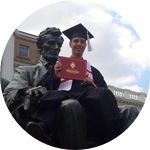About This Project
We are seeking a deeper understanding of the close relationship between altruism and compassion towards others, individual well-being for oneself, and how the ancient and modern mindfulness practices that are growing in popularity affect both sides of that equation. Following the inspiration of traditional teachings on meditation, we are investigating "self-identification", the grasping and attachment to a sense of "self" that is solid, independent, and unchanging. We believe that this cognitive process and the neural mechanisms underlying it will lead to a better understanding of well-being, compassion, and how meditation and other forms of mental training can affect them both.Ask the Scientists
Join The DiscussionWhat is the context of this research?
We are seeking a deeper understanding of the close relationship between altruism and compassion towards others, individual well-being for oneself, and how the ancient and modern meditation practices that are growing in popularity affect both sides of that equation. Following the inspiration of traditional teachings on meditation, we are investigating "self-identification", the grasping and attachment to a sense of "self" that is solid, independent, and unchanging. We believe that this cognitive process and the neural mechanisms underlying it will lead to a better understanding of well-being, compassion, and how meditation and other forms of mental training can affect them both.
Our research program has the following four phases:
Phase I: Developing and testing a collection of innovative behavioral tasks and questionnaires that relate to self-identification. We are testing these measures for reliability, validity, and consistency, to put together a "gold standard" for measuring the behavioral aspects of self-identification.
Phase II: Testing how self-identification affects well-being and altruism in a laboratory setting. We will measure self-identification in experimental participants, then collect data on their response to a harmless controlled pain stimulus, and also a realistic opportunity to donate money to strangers and charities.
Phase III: Using Functional Magnetic Resonance Imaging (FMRI) to look at the neural mechanisms of these effects.
Phase IV: Investigate how these neural and behavioral effects are changed by short-term or long-term meditation practice.
What is the significance of this project?
Our group has accumulated extensive data on neural mechanisms related to mindfulness, which is often considered to be one of the most important mental factors involved in meditation. As these studies progressed, we saw the need to analyze the cognitive mechanisms of meditation in greater detail, in addition to the neural mechanisms.
We went back to some of the ancient texts on meditation and found a common emphasis on changes in the conceptualization of the "self". These traditions describe a mental process of
grasping or attachment
towards a sense of self that is solid, real, unchanging, and important. This process, which we have translated as "self-identification", is said to lead to both suffering for oneself, and selfish behavior towards others. The current research program intends to develop ways of measuring self-identification, test its role in the effects of meditation on individual well-being and suffering, as well as identify how it can impact selfishness or compassion towards others.
What are the goals of the project?
The funds requested will enable us to collect questionnaire and behavioral task data on 50 participants to develop and test our different measures of self-identification. If we exceed our initial goal, it will enable us to include as many as 50 additional participants. If we exceed our goal even further, it will help us begin Phase II of the study, where we use the new self-identification measurement procedures to look at effects on individuals' response to a laboratory pain stimulus, as well as donations to strangers. Our budget also includes the fee to allow open-access publication.
If we are able to develop reliable measures of self-identification, and show a relationship to physical and behavioral domains, we hope to get a larger grant to collect these measures, along with FMRI brain scans, before and after a meditation training program designed in collaboration with experienced Tibetan Buddhist meditation instructors. We will continue to blog about our future findings as the study moves into more advanced phases!
Budget
We are using our PI's facilities, so we are seeking funds for expenses specific to this research project. Funds received from this campaign will go towards paying a research assistant to administer the study, and also the direct study expense of subject payments. Also, we would like to be able to publish open access, so we have included the publication fees in our budget.
Meet the Team
Affiliates
Team Bio
Dr. Richard "Richie" Davidson and the Center for Investigating Healthy Minds at the Waisman Center are well-known for innovative brain imaging studies on meditation, ranging from beginners to lifelong Tibetan Buddhist monks.
David Perlman(second from left) began as Richie's grad student in 2007, working with brain scans of meditators responding to pain. His work with advanced meditators, monks, and yogis has taken him to India a number of times. He has studied and practiced in the Tibetan Buddhist tradition since 2002, most recently under the close guidance of Younge Khachab Rinpoche.
As planning for the current study progressed, Rick Solis (second from right) joined the team to help with coding of stimuli and task design. Andrew Schoen (far right) was then recruited to assist with general research tasks, as well as study organization and planning. Most recently, Sarah Buszka (far left) joined the team to help with data collection.
Perlman Research Group at CIHM
Dr. Richard "Richie" Davidson and the Center for Investigating Healthy Minds at the Waisman Center are well-known for innovative brain imaging studies on meditation, ranging from beginners to lifelong Tibetan Buddhist monks.
David Perlman(second from left) began as Richie's grad student in 2007, working with brain scans of meditators responding to pain. His work with advanced meditators, monks, and yogis has taken him to India a number of times. He has studied and practiced in the Tibetan Buddhist tradition since 2002, most recently under the close guidance of Younge Khachab Rinpoche.
As planning for the current study progressed, Rick Solis (second from right) joined the team to help with coding of stimuli and task design. Andrew Schoen (far right) was then recruited to assist with general research tasks, as well as study organization and planning. Most recently, Sarah Buszka (far left) joined the team to help with data collection.
David M. Perlman
David Perlman grew up with an intense interest in knowledge and meaning. Pursuing physics at Caltech for the fabled "theory of everything", he became disillusioned upon failing to experience the fulfillment of meaning he had been seeking. After working in the computer industry in Seattle for some years he realized that meaning is in the domain of the mind. He became fascinated by neuroscience by reading Oliver Sacks, and also began practicing and teaching yoga and Tibetan Buddhist meditation since 2002. This combination led him to return to science in 2006 in the laboratory of Richie Davidson, which he considers the current best home for his pursuits. He hopes that his current focus on self-identification will help deepen the field of contemplative neuroscience and the dialog between East and West that Dr. Davidson has pioneered. David began as Richie's grad student in 2007, working with brain scans of meditators responding to pain. His work with advanced meditators, monks, and yogis has taken him to India a number of times. This has given him the wonderful opportunity to learn Tibetan Buddhist practice and scholarship under the close guidance of Younge Khachab Rinpoche.
Andrew Schoen
I am interested in investigating prosocial and altruistic behavior, genetic and biological correlates of behavior, and how these change throughout development.
Additional Information
Follow us on Twitter! UWSelfIdentification
David Perlman's meditation research and contemplative neuroscience blog!
Project Backers
- 25Backers
- 22%Funded
- $1,862Total Donations
- $74.48Average Donation



